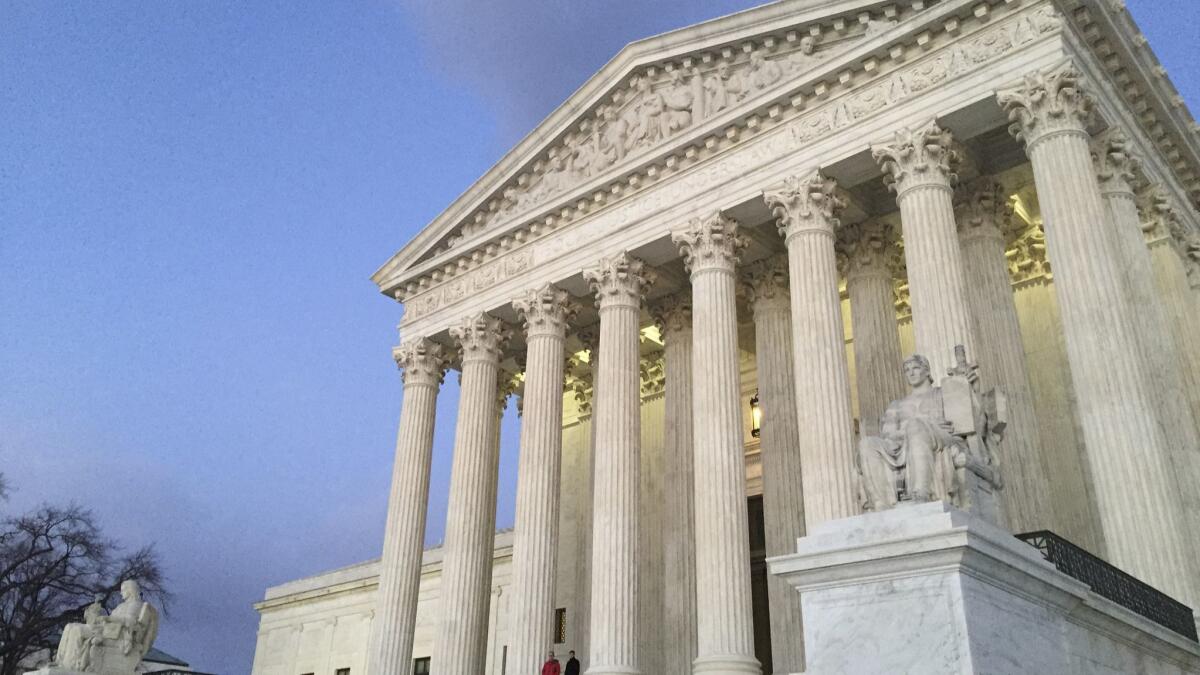California wins in Supreme Court after 28-year fight with inventor

- Share via
Reporting from Washington — The Supreme Court on Monday ended a 28-year-old tax suit bought against California by a wealthy inventor who moved to Nevada, issuing a broad ruling that shields states from private lawsuits filed in other states.
The 5-4 ruling is both a win for the California Franchise Tax Board and a victory for the conservative principle of state “sovereign immunity.”
The decision by Justice Clarence Thomas overturned a 40-year-old precedent to now “hold that states retain their sovereign immunity from private suits brought in the courts of other states.”
The court’s four liberals sounded a warning about the willingness of the conservative majority to overturn precedents.
“Today’s decision can only cause one to wonder which cases the court will overrule next,” Justice Stephen G. Breyer wrote, citing the 1992 case of Planned Parenthood vs. Casey in which the justices, by a 5-4 vote, reaffirmed a woman’s right to have an abortion. Many abortion rights supporters fear that Justice Brett M. Kavanaugh could provide the court’s conservative bloc a fifth vote to overturn some or all of the court’s abortion rulings.
There was no compelling reason today for the court to overturn the 1979 precedent that allowed the tax suit to proceed, Breyer wrote.
The tax case began in 1991 when Gilbert Hyatt, a California resident, began earning millions in royalties from a computer patent. He sold his house and rented an apartment in Nevada. And when he filed his tax returns in 1991 and 1992, he claimed his primary residence was Nevada, which had no tax state income tax.
California tax authorities thought his move was a sham and launched an investigation, including in Nevada, to show he maintained his residence in California.
The high court noted that the Franchise Board concluded Hyatt “owed California more than $10 million in back taxes, interest and penalties.” Hyatt lodged a protest, but the audit was upheld after an 11-year administrative proceeding. Thomas noted an appeal of the audit “remains pending.”
But Hyatt sued in Nevada, arguing that California tax authorities had harassed him and engaged in unconstitutional invasions of privacy. And he won a series of large judgments in the state courts.
California’s lawyers continued to fight the claims from the Nevada courts. And Monday, they finally prevailed in the case of Franchise Tax Board vs. Hyatt.
Thomas said the framers of the Constitution had an “understanding that states retained immunity from private suits, both in their own courts and in other courts.”
In the 1990s, the high court’s conservative majority handed down a series of decisions that shielded states from anti-discrimination claims filed by their residents.
The four dissenting justices said lawsuits of this sort were extremely rare. They would have maintained the rule set down in the 1979 case, which permitted such claims to go forward.
In the earlier case, Nevada vs. Hall, a divided court allowed a suit against Nevada in a California court over a highway accident caused by a state-owned bus. That case held that the Constitution allows states to provide immunity for other states, but does not require them to do so. Monday’s ruling makes such immunity mandatory.
“There is simply nothing in the Constitution” that requires such a rule, Breyer wrote.
More stories from David G. Savage »
More to Read
Get the L.A. Times Politics newsletter
Deeply reported insights into legislation, politics and policy from Sacramento, Washington and beyond. In your inbox three times per week.
You may occasionally receive promotional content from the Los Angeles Times.











